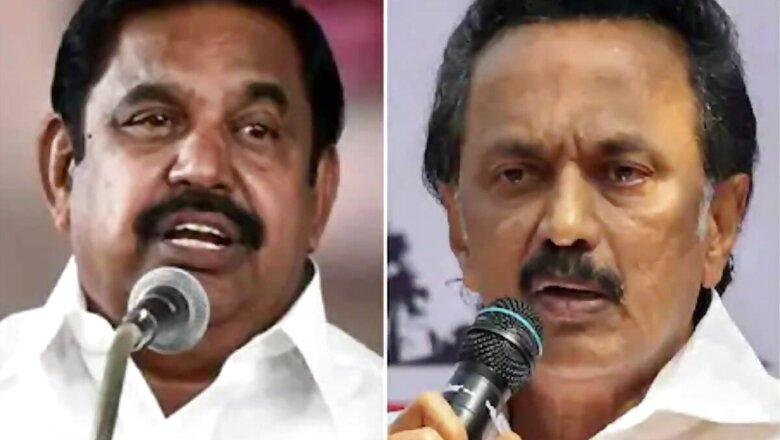
views
To date, with a little more than two weeks to go for the Assembly election in Tamil Nadu, cash and valuables worth nearly Rs 126 crore have been seized by various authorities in Tamil Nadu. By the time the elections are over, the seizures would probably amount to nearly Rs 500 crore. But this is the amount, probably a mere 5 per cent, that did not reach the voters. The rest, 95 per cent, or close to Rs 9,500 crore, would have been carefully distributed to the voters across the state, in order to influence the verdict.
Other states in India also see money playing a significant part in elections, but nowhere has this been taken to the level and sophistication as seen in Tamil Nadu. Historians say that even during the pre-1967 period, rich Congress candidates used to give one Rupee to each voter in specific constituencies. Over the next several decades, political parties certainly continued with selective money distribution to sway the undecided voters.
However, election watchers say large-scale money distribution was scientifically executed for the first time by DMK’s M.K. Alagiri, son of the late chief minister M. Karunanidhi, in what is now infamously known as the ‘Thirumangalam Formula’. Karunanidhi had banished his first son Alagiri to Madurai and instructed his partymen not to have any relationship with him. Alagiri was not interested in politics, but held considerable sway over the elected legislators of the DMK (Dravida Munnetra Kazhagam) in his region. In 2008, Karunanidhi had a change of heart and appointed Alagiri as the party convener for the southern region. In 2009, a by-election was held in Thirumangalam, a suburb in Madurai. A victory was assured for the DMK but Alagiri wanted to show his strength to impress his father, who was then the chief minister of Tamil Nadu. This meant that the voter turnout had to be humongous and the victory margin, equally so.
The story goes, he set about distributing money to every household. It is said that the number of votes in each house was counted and cash was stuffed, at the rate of Rs 500, in an envelope and delivered to every house. The result was, of course, a thumping victory for the DMK candidate.
ALSO READ| Tamil Nadu Elections: PMK Pushing for Quota, Not Assembly Seats in Tie-up with AIADMK is a Masterstroke
This increased the stakes in the 2011 Assembly election. Both the DMK and the AIADMK (All India Anna Dravida Munnetra Kazhagam) were believed to have distributed money but the scale of cash distribution in 2016 was unanticipated. Battling anti-incumbency, J. Jayalalithaa did not rely on coalition partners. She decided to go alone. By then, she had mastered the art invented by Alagiri—well-oiled system ensured money reached each and every corner of the state.
In some cases, it was alleged, the police colluded with party functionaries. There used to be mysterious power cuts, followed by money distribution and then restoration of power. Some last-mile innovations included top-up talk time instead of direct cash. The Election Commission could not do anything but, in a first, deferred polling on two seats after finding evidence of cash transfer. The AIADMK won the election handsomely, and when the by-elections were held later for the two constituencies, the party won those too.
Some examples that stand out
Every election, be it parliamentary or assembly, in Tamil Nadu since the last two decades has seen distribution of money to a large percentage of voters. Some key incidents, however, stand out.
After Jayalalithaa’s death in 2017, TTV Dhinakaran was put up as the candidate from her constituency, RK Nagar in Chennai, by the Sasikala faction. The amount of money flow was such that the Election Commission countermanded the election once again. Subsequently, many things changed. Sasikala was sentenced to prison in the Disproportionate Assets case. She made E. Palaniswami (EPS) the chief minister before she left. O. Panneerselvam (OPS) was sulking. However, the two factions later came together and ousted TTV Dhinakaran from the party.
The Election Commission eventually scheduled the by-election for RK Nagar the same year, but TTV Dhinakaran contested as an Independent and defeated the candidates of both the ruling AIADMK and the DMK. It was alleged that Dhinakaran’s camp gave a specially marked Rs 20 note to every voter saying it can be exchanged for a hefty amount later, since security was tightened in the constituency. But the story goes that the exchange never materialized!
It is not clear if demonetization had any role to play in curbing the money power. In the 2019 parliamentary elections, DMK’s general secretary Durai Murugan’s son Kathir Anand was the party candidate from Vellore seat. Income Tax officials raided his election office and seized considerable amount of cash, neatly packed and placed in envelopes, ready for distribution. Election Commission countermanded the election for the constituency. When, eventually, the election was held for this constituency, Kathir Anand won the seat.
An accepted trend
Law enforcement authorities or the Election Commission or the Income Tax department have no idea how to curb this patently illegal process. Worse still, people are now looking forward to cash distribution from the parties before an election and freebies from the government after the election. In my various conversations with people across the state, they have openly admitted to having received money from political parties. Some say they demand money from the parties when they learn others have received some. In fact, people have also complained to the party’s higher functionaries when they suspected the lower functionaries tasked with this work have siphoned off some money. People are known to take money from both the major parties but it is not clear which way they vote. Parties are also afraid of the electoral impact of not distributing cash.
ALSO READ| Actor Kamal Haasan is Ready to Play a New Role, Armed with a Script Different from Rivals
Another interesting thing here is, in many cases even if the constituency is allocated to a partner, the main parties provide not just electioneering and logistical support, but also help with money distribution from their own funds. It was always alleged that the DMK and the AIADMK paid a fixed sum of money to their coalition partners per constituency, but it came out in the open for the first time when an election expenditure affidavit revealed that Communist parties in 2019 had received Rs 25 crore from the DMK for campaign-related expenses.
This election season too will witness cash and valuables worth thousands of rupees being distributed directly to the people, besides the expense for advertising among other things. Tamil Nadu is perhaps the only state where money of this scale gets distributed. It is also the only state where, so far, four constituencies—3 Assembly and 1 parliamentary—had seen elections being countermanded on the grounds of bribery and corruption.
If both sides promise freebies and cash assistance when voted to power and are known to practice cash-for-votes, what distinguishes one from the other? What are the burning issues that bother people? We will look into these next.
This is the fourth in a series on Tamil Nadu elections by the author.
Read all the Latest News, Breaking News and Coronavirus News here



















Comments
0 comment